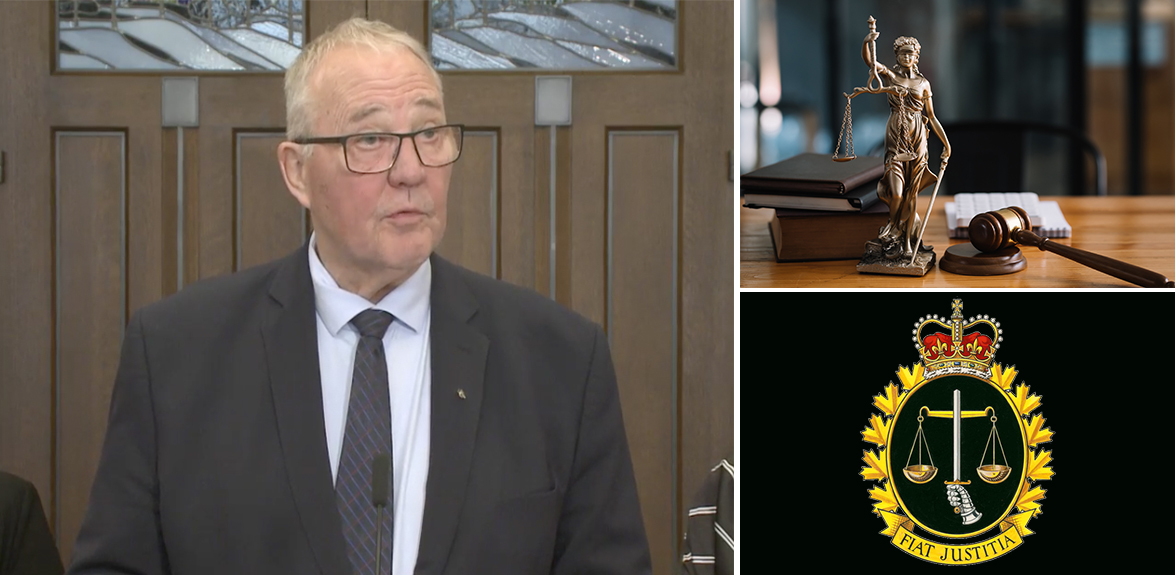Policy
Defence Minister Introduces Legislation to Modernize Military Justice System
The Minister of National Defence introduced legislation in an effort to modernize the military justice system and advance cultural change.
On March 21, 2024, Bill Blair, Minister of National Defence, introduced legislation to amend the National Defence Act (NDA), proposing targeted changes to modernize the military justice system.

Addressing Independent Review Recommendations
The proposed amendment addresses eight recommendations: 2, 7, 8, 10, 13, 14, 15, and 16 from former Supreme Court Justice Fish’s Third Independent Review of the National Defence Act report in 2020.
The amendments also address recommendations made in independent and external reviews by former Supreme Court Justice Louise Arbour.
“Members of the Canadian Armed Forces (CAF) are always there to keep Canada safe – and it is also our obligation to keep them safe from harassment and misconduct. This landmark legislation would transform military justice in Canada and address external recommendations received by former Supreme Court of Canada Justices Arbour and Fish. Through these measures and our ongoing efforts, we will build a diverse, inclusive, and supportive institution that can attract and retain talented people across our country,” said Blair in a press release.

Recommendation 5
Addressing Justice Arbour’s Independent External Comprehensive Review Recommendation 5, the proposed legislation would definitively remove the CAF’s jurisdiction to investigate and prosecute Criminal Code sexual offences committed in Canada.
The proposed legislation would provide exclusive jurisdiction to civilian authorities to investigate and prosecute such offences committed in Canada.
“The introduction of this legislation reflects our commitment to maintaining the highest standards of accountability and fairness, crucial for the integrity of the military justice system. By modernizing our processes, we’re strengthening the fundamental foundation of trust and confidence, which is indispensable for fostering discipline, efficiency, and morale within the CAF,” said General Wayne Eyre, Chief of the Defence Staff.
Expand Eligibility Criteria for Military Judges
The legislation also seeks to expand the eligibility criteria for military judges to include non-commissioned members, which the press release noted “would help diversify the pool of potential candidates.”
“The amendments aim to bolster the trust and confidence of Canadians in the military justice system,” stated the press release.
Amend NDA
Along with the amendments mentioned above, the proposed legislation seeks to amend the NDA further by:
- Excluding military judges from the summary hearing system and expanding access to Victim Liaison Officers, under the Declaration of Victims Rights, to individuals acting on behalf of a victim.
- To align sex offender information and publication ban provisions with the amendments made to the Criminal Code in An Act to amend the Criminal Code, the Sex Offender Information Registration Act and the International Transfer of Offenders Act. The amendments are necessary to ensure the military justice system remains constitutional and aligned with the Criminal Code and the civilian criminal justice system.
Independent Review Recommendations
Section 273.601 of the NDA requires the Minister of National Defence to generate an Independent Review of specified provisions of the Act and its operation and present a report of the review to Parliament.
The First Independent Review was by the late Right Honourable Antonio Lamer, retired Chief Justice of Canada (report tabled in 2003), and the Second Independent Review was by the Honourable Patrick LeSage, retired Chief Justice of the Ontario Superior Court of Justice (report tabled in 2012).

Justice Fish’s Recommendations
On November 5, 2020, Harjit S. Sajjan, then Minister of National Defence, appointed former Justice of the Supreme Court of Canada Morris J. Fish, as the Independent Review Authority (IRA) to conduct an Independent Review of specified provisions of the NDA, including those related to military justice, military policing and police oversight, military grievances and external review of grievances.
The report contained 107 recommendations, most of which dealt with the military justice system, including how issues of sexual misconduct are addressed, military policing, and police oversight—the remainder of the recommendations concerned military grievances and the external review of grievances.
The eight recommendations addressed in the proposed legislation include:
- Recommendation #2: The National Defence Act should be amended to allow the Governor in Council to appoint to the position of military judge anyone who is a barrister or advocate of at least 10 years’ standing at the bar of a province and who has been an officer or a noncommissioned member of the Canadian Armed Forces, including the Reserve Force, for at least 10 years.
- Recommendation #7: The Director of Military Prosecutions and Director of Defence Counsel Services should be appointed by the Governor in Council, on the recommendation of the Minister of National Defence. The Director of Military Prosecutions and Director of Defence Counsel Services should hold office during good behaviour for a term of seven years, subject to removal by the Governor in Council at any time for cause with the support of a resolution of the House of Commons to that effect. They should not be eligible to be reappointed for a further term of office.
- Recommendation #8: Subsections 165.17(3) to 165.17(6) of the
National Defence Act should be repealed. If a power to issue directives in respect of a particular prosecution is to remain, this power should, at a minimum, be granted to the Minister of National Defence personally and not the Judge Advocate General. Any directive issued to the Director of Military Prosecutions should be required to be in writing and to be published in the Canada Gazette. The Minister of National Defence or the Director of Military Prosecutions should be authorized to direct that the publication be delayed at the latest until the completion of the prosecution or any related prosecution if either considers this delay to be in the interests of the administration of military justice. - Recommendation #10: Section 9.2 of the National Defence Act should be amended to clarify the meaning of the Judge Advocate General’s “superintendence of the administration of military justice in the Canadian Forces”. At a minimum, the National Defence Act should expressly provide that the superintendence must respect the independence of military prosecutors, military defence counsel and other statutory actors within the military justice system.
- Recommendation #13: Section 18.3 of the National Defence Act should be amended to provide that the Canadian Forces Provost Marshal be appointed by the Governor in Council and hold office during pleasure. The Chief of the Defence Staff should accordingly have no authority to remove the Canadian Forces Provost Marshal. The Canadian Forces Provost Marshal should be responsible to the Minister of National Defence in the performance of his duties and functions. References to the Vice Chief of the Defence Staff in section 18.5 of the National Defence Act should consequently be replaced by references to the Minister of National Defence. Moreover, section 18.6 of the National Defence Act should be amended to provide that the Canadian Forces Provost Marshal report annually to the Minister of National Defence on the activities of the Canadian Forces Provost Marshal and the military police during the year.
- Recommendation #14: The National Defence Act should be amended to restyle the Canadian Forces Provost Marshal as the Provost Marshal General and to provide that the Canadian Forces Provost Marshal holds a rank that is not less than brigadier-general.
- Recommendation #15: Subsections 18.5(3) to 18.5(5) of the National Defence Act should be repealed. For greater clarity, section 18.5 of the National Defence Act should be amended to provide that the general supervision and authority of the Vice Chief of the Defence Staff (or of the Minister of National Defence if Recommendation #13 is implemented) to issue general instructions or guidelines do not include a power to give directions regarding specific law enforcement decisions in individual cases.
- Recommendation #16: Subsection 250.19(1) of the National Defence Act should be amended to provide that “[a]ny person, including any officer or non-commissioned member, who believes on reasonable grounds that any officer or non-commissioned member or any senior official of the Department has improperly interfered with a policing duty or function” may make an interference complaint to the Military Police Complaints Commission.
Read Independent Reviews
Read the Third Independent Review of the National Defence Act Report here.
Learn more about the Independent Reviews of the National Defence Act Report here.










